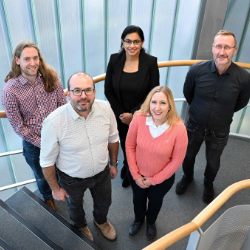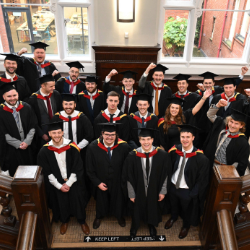-
Study
-
Quick Links
- Open Days & Events
- Real-World Learning
- Unlock Your Potential
- Tuition Fees, Funding & Scholarships
- Real World Learning
-
Undergraduate
- Application Guides
- UCAS Exhibitions
- Extended Degrees
- School & College Outreach
- Information for Parents
-
Postgraduate
- Application Guide
- Postgraduate Research Degrees
- Flexible Learning
- Change Direction
- Register your Interest
-
Student Life
- Students' Union
- The Hub - Student Blog
- Accommodation
- Northumbria Sport
- Support for Students
-
Learning Experience
- Real-World Learning
- Research-enriched learning
- Graduate Futures
- The Business Clinic
- Study Abroad
-
-
International
International
Northumbria’s global footprint touches every continent across the world, through our global partnerships across 17 institutions in 10 countries, to our 277,000 strong alumni community and 150 recruitment partners – we prepare our students for the challenges of tomorrow. Discover more about how to join Northumbria’s global family or our partnerships.
View our Global Footprint-
Quick Links
- Course Search
- Undergraduate Study
- Postgraduate Study
- Information for Parents
- London Campus
- Northumbria Pathway
- Cost of Living
- Sign up for Information
-
International Students
- Information for International Students
- Northumbria and your Country
- International Events
- Application Guide
- Entry Requirements and Education Country Agents
- Global Offices
- English Requirements
- English Language Centre
- International student support
- Cost of Living
-
International Fees and Funding
- International Undergraduate Fees
- International Undergraduate Funding
- International Masters Fees
- International Masters Funding
- International Postgraduate Research Fees
- International Postgraduate Research Funding
- Useful Financial Information
-
International Partners
- Agent and Representatives Network
- Global Partnerships
- Global Community
-
International Mobility
- Study Abroad
- Information for Incoming Exchange Students
-
-
Business
Business
The world is changing faster than ever before. The future is there to be won by organisations who find ways to turn today's possibilities into tomorrows competitive edge. In a connected world, collaboration can be the key to success.
More on our Business Services-
Business Quick Links
- Contact Us
- Business Events
- Research and Consultancy
- Education and Training
- Workforce Development Courses
- Join our mailing list
-
Education and Training
- Higher and Degree Apprenticeships
- Continuing Professional Development
- Apprenticeship Fees & Funding
- Apprenticeship FAQs
- How to Develop an Apprentice
- Apprenticeship Vacancies
- Enquire Now
-
Research and Consultancy
- Space
- Energy
- AI and Tech
- CHASE: Centre for Health and Social Equity
- NESST
-
-
Research
Research
Northumbria is a research-rich, business-focused, professional university with a global reputation for academic quality. We conduct ground-breaking research that is responsive to the science & technology, health & well being, economic and social and arts & cultural needs for the communities
Discover more about our Research-
Quick Links
- Research Peaks of Excellence
- Academic Departments
- Research Staff
- Postgraduate Research Studentships
- Research Events
-
Research at Northumbria
- Interdisciplinary Research Themes
- Research Impact
- REF
- Partners and Collaborators
-
Support for Researchers
- Research and Innovation Services Staff
- Researcher Development and Training
- Ethics, Integrity, and Trusted Research
- University Library
- Vice Chancellors Fellows
-
Research Degrees
- Postgraduate Research Overview
- Doctoral Training Partnerships and Centres
- Academic Departments
-
Research Culture
- Research Culture
- Research Culture Action Plan
- Concordats and Commitments
-
-
About Us
-
About Northumbria
- Our Strategy
- Our Staff
- Our Schools
- Place and Partnerships
- Leadership & Governance
- University Services
- Northumbria History
- Contact us
- Online Shop
-
-
Alumni
Alumni
Northumbria University is renowned for the calibre of its business-ready graduates. Our alumni network has over 253,000 graduates based in 178 countries worldwide in a range of sectors, our alumni are making a real impact on the world.
Our Alumni - Work For Us
What will I learn on this module?
This module will introduce you to key physics topics through a range of industrial and practical contexts. The contexts will include space technology and astrophysics, medical applications including bioengineering and non-invasive testing, music, renewable energy technologies, geophysics and the history of physics.
The physics topics studied in this module are:
- waves and oscillations including reflection, refraction, polarisation, stationary waves, simple harmonic motion and damping.
- material properties including flow of liquids and viscosity, properties of materials and Young modulus
- particle and nuclear physics including the structure of the atom, radioactive decay, nuclear fusion and fission, luminosity of stars and blackbody radiators.
- nature of light including wave-particle duality, photoelectric effect, photovoltaic cells, absorption and emission spectra, and energy levels
How will I learn on this module?
You will learn through a combination of lectures and problem solving sessions as well as directed and independent learning. The lectures will follow an integrated approach to learning with initial information dissemination, followed by the opportunity to practice the application of knowledge through structured questions and a formative approach to assessment with problems to solve. Seminar sessions will allow you to contextualise further the topics introduced in the lectures. You will also be provided with passages of contemporary text and research papers to read and respond to during seminars. There will also be online problem solving activities (Isaac Physics) which will be completed between lectures. Some sessions will involve group tasks to foster teamwork and enhance your knowledge of the contexts through peer engagement.
How will I be supported academically on this module?
During the problem solving seminars, module tutors will provide verbal feedback and comments. Such comments may be generic and applicable to all students, or could be more directed to your individual learning and understanding of the subject. Appropriate use of the eLearning Portal (online platform) is made in the module where the module taught content is provided along with links to both the reading list support, tutorial questions and appropriate web sites providing deeper or further contexts in relation to the topics in the module. You will be additionally supported in this module in the form of Individual contact -- students may visit the office of Lecturers/Lab tutors to ask questions related to the module outside the scheduled contact time.
What will I be expected to read on this module?
All modules at Northumbria include a range of reading materials that students are expected to engage with. Online reading lists (provided after enrolment) give you access to your reading material for your modules. The Library works in partnership with your module tutors to ensure you have access to the material that you need.
What will I be expected to achieve?
You will be able to:
Knowledge & Understanding:
MLO1. Demonstrate the use of physics concepts in an applied context.
Intellectual / Professional skills & abilities:
MLO2. Use appropriate physics knowledge to interpret a range of physics problems.
Personal Values Attributes (Global / Cultural awareness, Ethics, Curiosity) (PVA):
MLO3. Describe information and ideas in written and oral form.
MLO4. Manage time and resources to complete assignments.
How will I be assessed?
Summative Assessment:
There will be 2 summative assessments.
1. CW – Written assignment (50%) as a research report (MLO1, MLO2, MLO3, MLO4) (2000 words max).
2. Exam – Examination with questions based on scientific papers (50%) aimed at assessing the understanding of the content and of the use of physical principles in the papers (MLO1, MLO2, MLO3, MLO4). Students will be provided with a formula and data sheet and may bring in their own notes into the exam.
Formative assessment
Verbal formative feedback will be provided in problem solving seminars. This feedback will assist students in advancing their knowledge and understanding of the subject matter. Online feedback will be provided using Isaac Physics.
Pre-requisite(s)
NA
Co-requisite(s)
NA
Module abstract
Applications of Physics introduces you to a wide range of real-world contexts where physics concepts are key for understanding. The module focuses on waves and oscillations, material properties, particle and nuclear physics and the nature of light. The module further shows how these concepts can be used in a variety of ways to help you in analysing and solving physical problems. Problem solving seminars will allow you to put this into practice, and also introduce some hands-on practical problems solving activities. The module is assessed by means of a written research report assignment and an examination, weighting 50% and 50% of the final mark respectively. These assignments will support the development of your subject knowledge and also your ability to present information in written forms. These are key employability skills that are valued by employers.
Course info
UCAS Code F233
Credits 20
Level of Study Undergraduate
Mode of Study 1 year Full Time followed by a further 3 years Full Time or 4 years with a placement (sandwich)/study abroad
School Engineering, Physics and Mathematics
Location City Campus, Northumbria University
City Newcastle
All information is accurate at the time of sharing.
Full time Courses are primarily delivered via on-campus face to face learning but could include elements of online learning. Most courses run as planned and as promoted on our website and via our marketing materials, but if there are any substantial changes (as determined by the Competition and Markets Authority) to a course or there is the potential that course may be withdrawn, we will notify all affected applicants as soon as possible with advice and guidance regarding their options. It is also important to be aware that optional modules listed on course pages may be subject to change depending on uptake numbers each year.
Contact time is subject to increase or decrease in line with possible restrictions imposed by the government or the University in the interest of maintaining the health and safety and wellbeing of students, staff, and visitors if this is deemed necessary in future.
Useful Links
Find out about our distinctive approach at
www.northumbria.ac.uk/exp
Admissions Terms and Conditions
northumbria.ac.uk/terms
Fees and Funding
northumbria.ac.uk/fees
Admissions Policy
northumbria.ac.uk/adpolicy
Admissions Complaints Policy
northumbria.ac.uk/complaints










